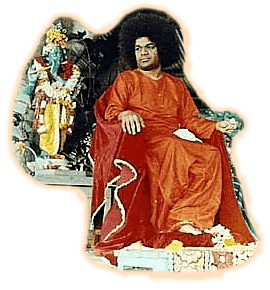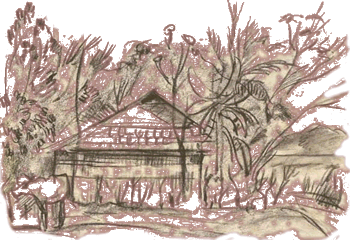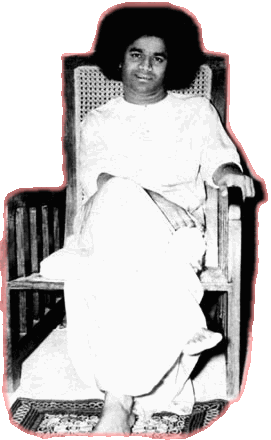|
Other Baba-books
|
||||||||
 |
The original
Sanskrit verses and with comments taken from the writings of
|
|||||||
|
'That indeed
is true spiritual education which
1 2a 2b 3 4 5 6 7 8 9 10 11 12 13 14 15 16 17 18a 18b
"In
seventeen verses, from the 56th to the 72nd, Krishna described in the second
chapter the
characteristics of the sthitapraj˝a and the excellence of that stage. Then,
saying that He Himself had established j˝ānayoga for the sānkhyas
and karmayoga for the yogīs, as means of attaining liberation, He
spoke of the importance of karma." - Gītā Vahini, p. 42 " Listen to this spoken
chapter in Audio " arjuna uvāca vyāmiśreneva
vākyena śrī-bhagavān
uvāca na karmanām
anārambhān na hi
kaścit kshanam api
"Prakruti
(prakriti) or nature is the sum of attributes or characteristics. The gunas
(modes of material nature), tamas (ignorance), rajas
(passion) and satva (goodness) are the attributes of prakriti.
Nature is but the permutation and combination of these gunas. So also
are the attributes of doer (karthritva) and enjoyer
(bhoktrhitva)." - Gītā Vahini, p. 190.
You might say that you will desist
from karma rather than practice the difficult discipline of
renouncing the fruits thereof. But that is impossible. No; it is
inevitable; one has to do some karma or other. Not for a single
moment can one free oneself from karma 'na hi kaścit
kshanam api' says Krishna, in the third chapter of the Gītā [B.G.
3:5]. - Gītā
Vahini, p. 33. karmendriyāni
samyamya yas tv
indriyāni manasā
Control
of
the
senses
is
very
essential
for
man.
Giving free play to them just
because they belong to you is foolishness. Although it be your own
horse, if you do not hold the reins tight while riding, you will meet
with disaster. Similarly, you may say, "I have given money and
purchased this car; it is registered in my name and it is my car," but
if you do not apply the brakes when necessary, even though it is your
own car, it will lead you to danger. Sense control is thus an
imperative for all human beings and not just for yogīs and sannyāsīs.
By
letting
himself
be
enslaved
by
his
senses,
man is degrading himself.
The royal road to perfection consists of controlling one's senses,
praying to the Almighty, and finally merging in Him - Summer
Showers
in
Brindavan
1979,
p.
44
niyatam
kuru karma tvam
Every one has to bow to the demands of nature and engage himself in
karma; it is inevitable. Therefore, Krishna said,
"Do the karthavya-karmas, karma that is your bounden
duty. Being engaged in karma is to be preferred to not being so
engaged. If you desist from karma, the task of living becomes
difficult, nay, impossible. - Gītā Vahini, p. 42. yaj˝ārthāt
karmano 'nyatra saha-yaj˝āh
prajāh srishthvā
Dharma is capable of conferring all that
man wishes for, here and hereafter. It is the kāmadhenu, the celestical
cow that grants all boons [see also: S.B.
9:15-26] . - Sathya Sai Speaks VI, p.
214-5 devān
bhāvayatānena ishthān
bhogān hi vo devā
Yaj˝a means, "any activity dedicated to the glory of
God", not merely this activity prescribed in the ancient scriptures.
Activity dedicated to the glory of God is being done and can be done in
all climes, in all realms, by all races. The "dedication" ensures
success. Without it, there will inevitably arise anxiety, fear and
faction. Every activity in the world is God-directed, God-ward moving,
whether you know or do not know. Only one has to be aware of it and
share in the thrill of that knowledge. - Sathya Sai Speaks VIII, p. 117 yaj˝a-śishthāśinah
santo annād
bhavanti bhūtāni karma
brahmodbhavam viddhi
Krishna taught Arjuna the origins of karma, the roots from
where the urge to do karma sprouts and grows; He taught them so
clearly that Arjuna's heart was really moved and modified. "The Vedas
emanated from God; karmas emanated from the Vedas; from
karma originated yaj˝a, from yaj˝a,
rain; from rain grew food; from food came all living beings."This is
the cycle that has to be accepted and honored. -
Gītā
Vahini,
p.
42.
evam
pravartitam cakram
If the wheel of creation is to move smooth, each one has to keep on
doing karma. Whoever he is, he cannot get round this
obligation. Even he who has achieved the highest j˝āna has to
observe this rule. Eating and drinking, intake and release of breath,
these too are karmas. Who can exist without these acts? -
Gītā Vahini, p. 43. yas tv
ātma-ratir eva syād naiva tasya
kritenārtho tasmād
asaktah satatam karmanaiva
hi samsiddhim
That is why it is said that King Janaka could attain the highest
state by doing his daily work always in a spirit of dedication. We
should cultivate the spirit of surrender, saying, "I am Thine." - Summer Showers in Brindavan
1979, p. 39 yad yad
ācarati śreshthhas
You may wonder why j˝ānis should still do karma.
Not only you but many others may be worried at that statement. Well,
people usually follow the ideal set by those in higher levels. Their
acts form the basis of dharma for all. If j˝ānis are
inactive, how are ordinary mortals to save themselves? They have no
guide, so they lose themselves in the easy paths of sensory pleasure.
The duty of the wise is to foster the right and to practice it before
others, so that they too may be prompted to follow, drawn by the hope
of becoming as contented and as joyful as they are. The wise have to do
and get done, see and show, so the rest might be persuaded to follow
the example set by them. - Gītā Vahini, p. 43-4. na me
pārthasti kartavyam
The īśvara or Lord is the fulfillment of all desires; all
objects of enjoyment in the universe emanate from His will; so, He has
no desires at all. He has manifested the universe not for the
realization of any desire of His or for filling any vacuity from which
He suffered, but for the benefit entirely of living beings. "na me
pārthasti kartavyam trishu lokeshu ki˝cana" - "There is no duty
binding on me, Partha, in the three worlds", says Krishna. Creation,
manifestation, or emanation is His very nature. Hence, the description (līlā
vinodi) 'reveling in play' is often ascribed to Him. It is His
willpower that is filling all living beings with consciousness and
helping them to be alert and active. He grants to each the consequence
of thought, word, and deed and is therefore described as the 'giver-of-the-fruit-of-activity'
(karma-phala-pradatha). Without the intercession of the Lord,
activity cannot result in consequence; nor can certainty arise that a
particular act will result in an identifiable manner. Besides, the
sages declare that karma (activity) is momentary. The thought
arises and the act is done. The act is followed by the fruit. It is not
possible to predict when the fruit will be available or what its nature
will be. Hence, we have to admit that it all depends on the Lord's
command. What cannot be interpreted by our limited intellect has to be
ascribed to His command. - Sanathana Sarathi, November 1979, p. 242-3 yadi hy
aham na varteyam
"Consider this, o Arjuna: I have no need to do any karma;
no,
not
anywhere
in
the
three
worlds.
I
am under no compulsion. Still,
I am ever engaged in karma. Think of this. If I desist, the
world will be no more. Have steady faith in the ātmā; then
dedicate all acts of yours to Me; with no desire for the fruit thereof,
no egoism, and no sense of possession or pride, engage in battle", said
Krishna. - Gītā
Vahini, p. 43 utsīdeyur
ime lokā saktāh
karmany avidvāmso
"Arjuna! Undertake work in order to please God and not to
gratify the senses. Your actions are responsible for elevation to the
highest state or degradation to the lowest planes. Your joys and
sorrows proceed from your own actions. Your actions are responsible for
your sins and virtues. Fix your mind on the ātmā and do your
work for the pleasure of God; your actions will then be disinterested.
Disinterested action destroys the demoniacal qualities of man and
promotes the divine tendencies. It strengthens pure and satvic
qualities in man. Thus, it is said that man has only the authority to
act and that it is God who dispenses the fruits of man's actions. You
should not undertake any work in the hope of receiving its fruit. You
will become an exemplar for the world when you achieve control of the
senses and undertake disinterested actions. As the representative of
mankind, o Arjuna, you should take a pledge to perform sacred actions."
- Summer
Showers in Brindavan 1979, p. 37 na
buddhi-bhedam janayed
"Almost everyone in the world is bound by the rule of karma.
But
people
are
so
immersed
in
ignorance
that
they are unaware of their
own moral or intellectual status and of the secrets of karma.
Such can be saved only by being inspired by the example of the great.
That is why the j˝āni has to be engaged in activity; he has to
remove the sloth and delusion of ordinary men. So all have to obey the
rule of karma, without any deviation. - Gītā Vahini, p. 44 prakriteh
kriyamānāni tattva-vit
tu mahā-bāho prakriter
guna-sammūdhāh mayi
sarvāni karmāni
"Krishna advised Dhana˝jaya, "Arjuna! You are becoming a
victim of abhimana and mamakara (mine-ness) and falling
into a mood of dejection. You should not let your human nature be
affected by feebleness. When you undertake action in a spirit of
dedication to the Lord, when you work with your body without any
consideration of the fruits of your action, then you traverse the royal
path." - Summer
Showers in Brindavan 1979, p. 39 ye me matam
idam nityam ye tv etad
abhyasūyanto sadriśam
ceshthate svasyāh indriyasyendriyasyārthe śreyān
sva-dharmo vigunah
"You have been told that 'sva-dharme nidhanam śreyah
para-dharmo bhayāvahah'. This means that in carrying out one's own
dharma, even if one perishes, it is far better than
taking to dharma not belonging to oneself. The latter path is
beset with fear. - Summer
Showers
in
Brindavan
1979,
p.
146 arjuna uvāca śrī
bhagavān uvāca
Krishna taught Arjuna, "Desire and anger, born of rajas,
are
the
greatest
enemies
of
man.
They
stifle
his innate goodness. Out
of the three basic traits in man, the rajasic and the tamasic
traits oppose his interests. Kāma or desire, derived from rajas,
knows
no
satiation
even
as
a
raging
fire
does not. It shakes man's
inner poise and leads him astray. It creates a breach in man's heart
and enters therein. After its entry, anger and the attendant vices join
the invasion and steal the j˝ānaratha (jewel of wisdom) kept
therein." - Summer
Showers
in
Brindavan
1979,
p.
43-4 dhūmenāvriyate
vahnir
Krishna said, "Kāma (lust, desire to always
want more plus not willing to let go for reason of emotional
preference) is the root cause of all evil", and He elaborated on its
nature and cure. "He who is bound by the deha-ātmā-buddhi (the
false idea that he is just this body and nothing more) can never hope
to conquer karma; one must acquire the brahma-ātmā-buddhi
(the awareness that he is just Brahman, and nothing less) in
order to be sure of victory. All acts must be performed in the spirit
of dedication to the Lord. The universe must be identified with the
form of Vishnu, the universal transcendent." - Gītā Vahini, p. 45 āvritam
j˝ānam etena
Desire makes man forget his real nature and reduces
him to the status of a beast. It robs him of all his virtues and
jeopardizes his honor and reputation. - Summer Showers in Brindavan 1979, p. 44 indriyāni
mano buddhir tasmāt tvam
indriyāny ādau
Good education consists in training you to control your sense
organs and to make them grow in the right direction. The process that
enables you to control your sense organs should be regarded as the
right type of education. The excitement that comes from your sense
organs is something that destroys the human qualities and sometimes
brings disgrace. - Summer
Showers
in
Brindavan
1979,
p.
5 indriyāni
parāny āhur evam
buddheh param buddhvā
Your sudden decision not to fight clearly indicates that some
powerful force is shaking your confidence and making you alter your
prior decision. This force obviously is desire. Turn your desire
Godward and perform actions as offerings to God. It is futile to waste
time by pondering over the matter any further. Realize the immanence of
God and perform your duty. - Summer Showers in Brindavan 1979, p. 44
In this chapter, three important subjects have been clarified: (1)
Everyone has to do karma, for if this is not done, the world
will come to nought. (2) The karma of the great is the ideal
that the rest have to keep in view. (3) Almost all in the world are
bound by the obligation of karma. - Gītā Vahini, p. 45
|
||||||||





